Key takeaways:
- Women earn, on average, 82 cents for every dollar earned by men, with significant disparities for women of color (63 cents for Black women, 55 cents for Hispanic women).
- Advocating for equal pay fosters a culture of inclusivity, boosts employee morale, and benefits the economy by increasing overall spending power.
- Strategies for promoting equal pay include enhancing transparency in salary discussions, providing negotiation skills training for women, and forming alliances with advocacy groups.
- Personal experiences highlight the emotional impact of pay gaps, emphasizing the need for acknowledgment and respect in the workplace for all contributions, regardless of gender.
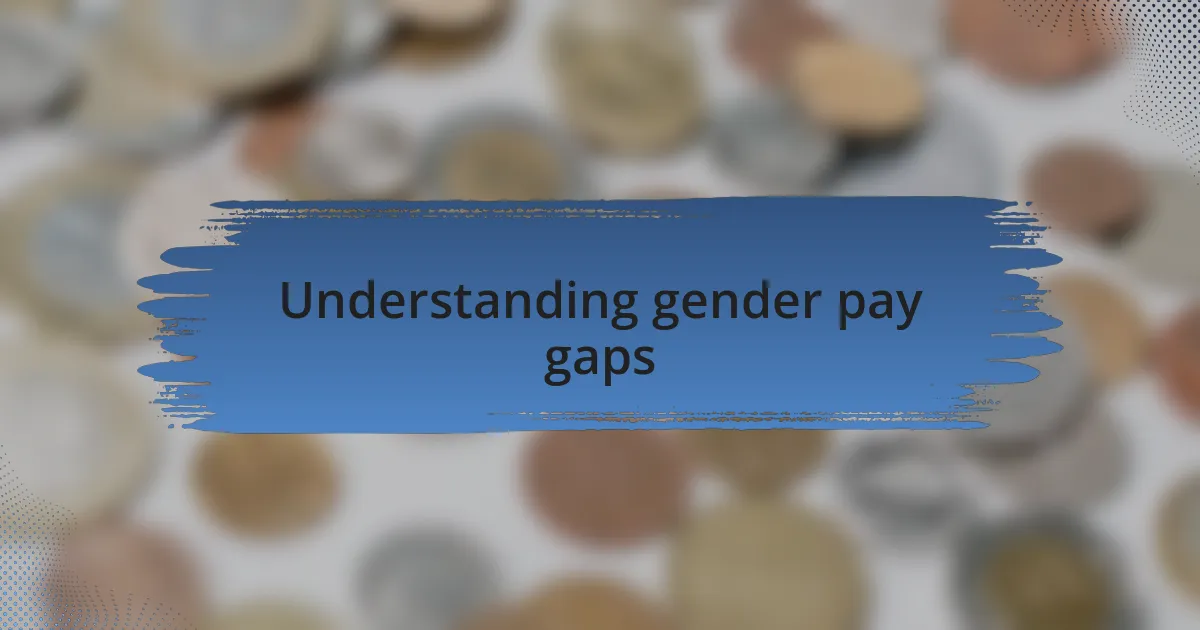
Understanding gender pay gaps
Understanding gender pay gaps is essential to dismantling the barriers that perpetuate inequality in the workplace. From my own experience, I’ve witnessed the subtle ways bias can infiltrate salary discussions, where women often feel pressured to accept less than their worth. Have you ever noticed how negotiation tactics differ depending on gender?
The statistics paint a stark picture: women frequently earn only a fraction of what their male counterparts do, which often leaves them feeling undervalued. I remember a colleague who, despite delivering outstanding results, consistently received lower raises than her male peers. How does that make sense when the contributions are equal?
It’s crucial to address these gaps in a meaningful way. I frequently see organizations acknowledging the issue but hesitating to implement real change. This makes me wonder, how many more talented individuals will leave the workforce simply due to wage discrepancies? Understanding these gaps allows us to advocate for systemic changes that benefit everyone.
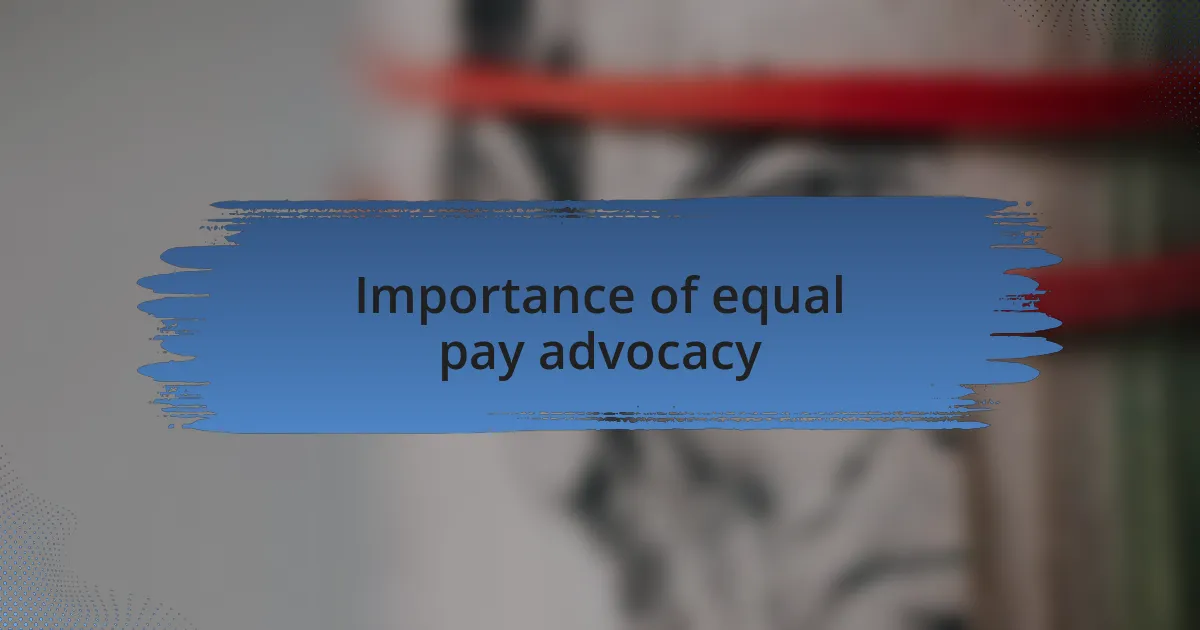
Importance of equal pay advocacy
Equal pay advocacy is essential because it not only aims to correct financial disparities but also fosters a culture of inclusivity. I recall a time when I felt compelled to speak up during a team meeting about pay differences. Seeing the surprised reactions reinforced the idea that many are unaware of their own privileges or the injustice happening right under their noses. Isn’t it surprising how easily we can overlook inequality when we are not directly affected?
When we advocate for equal pay, we support the idea that everyone deserves fair compensation for their work, regardless of gender. In my experience, I’ve witnessed the morale boost in an organization when pay equity is prioritized. Employees, especially women, feel more valued and engaged when they believe their contributions are recognized and rewarded fairly. Have you ever noticed how an empowered workforce can drive innovation?
Moreover, advocating for equal pay benefits the wider economy by increasing overall spending power and lifting families out of poverty. I remember reading about a community where closing the gender pay gap led to increased investment in local businesses. This made me think about the ripple effect that fair pay can create. Why should we settle for anything less than a thriving economy, fueled by equitable compensation for all?
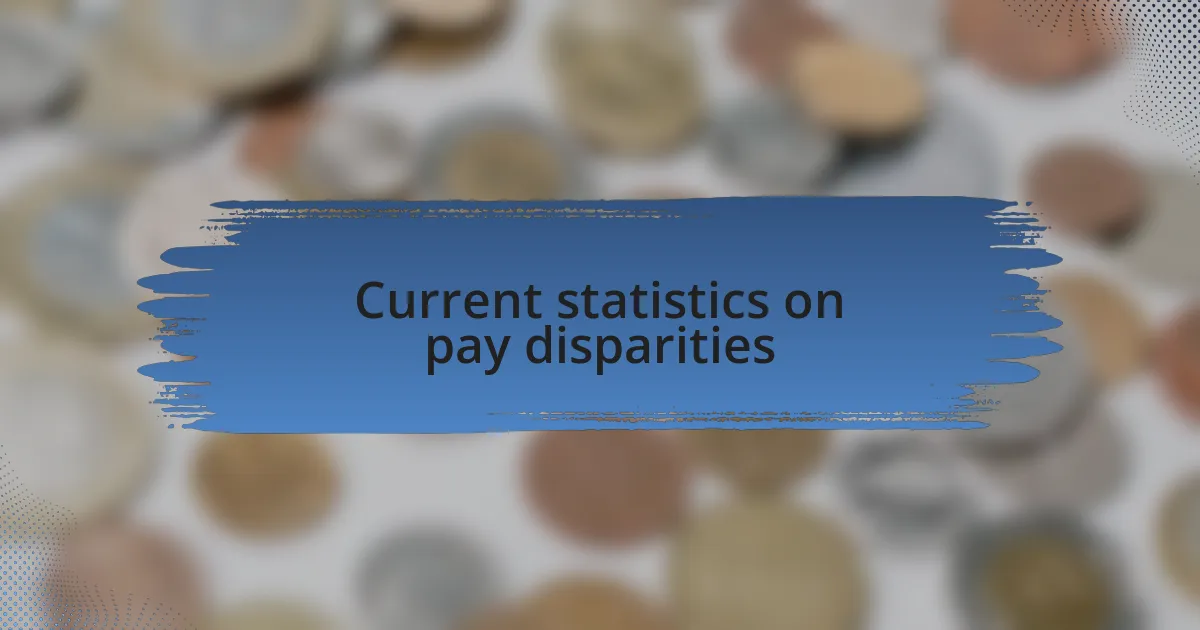
Current statistics on pay disparities
As I dive into the statistics surrounding pay disparities, the numbers tell a profound story. Currently, women earn, on average, 82 cents for every dollar earned by men, a statistic that hasn’t shifted significantly over the last decade. This lingering gap reminds me of how often people underestimate the persistence of inequality—it’s almost like the status quo becomes invisible.
Looking closer, I find that the disparities are even starker for women of color. For instance, Black women earn only about 63 cents compared to men’s dollar, while Hispanic women fare even worse at approximately 55 cents. It’s disheartening to think that the color of one’s skin can further entrench wage inequality. I can’t help but wonder how many talented individuals are stifled by this injustice and what a tremendous loss it represents for our society.
On an organizational level, companies that prioritize pay equity report higher employee satisfaction and lower turnover rates. I’ve seen firsthand how a commitment to fair pay fosters loyalty and encourages teamwork. But I ask you, what kind of workplace culture are we fostering if we allow these disparities to persist? Every statistic is not just a number; it represents a person with dreams and ambitions impacted by inequality.
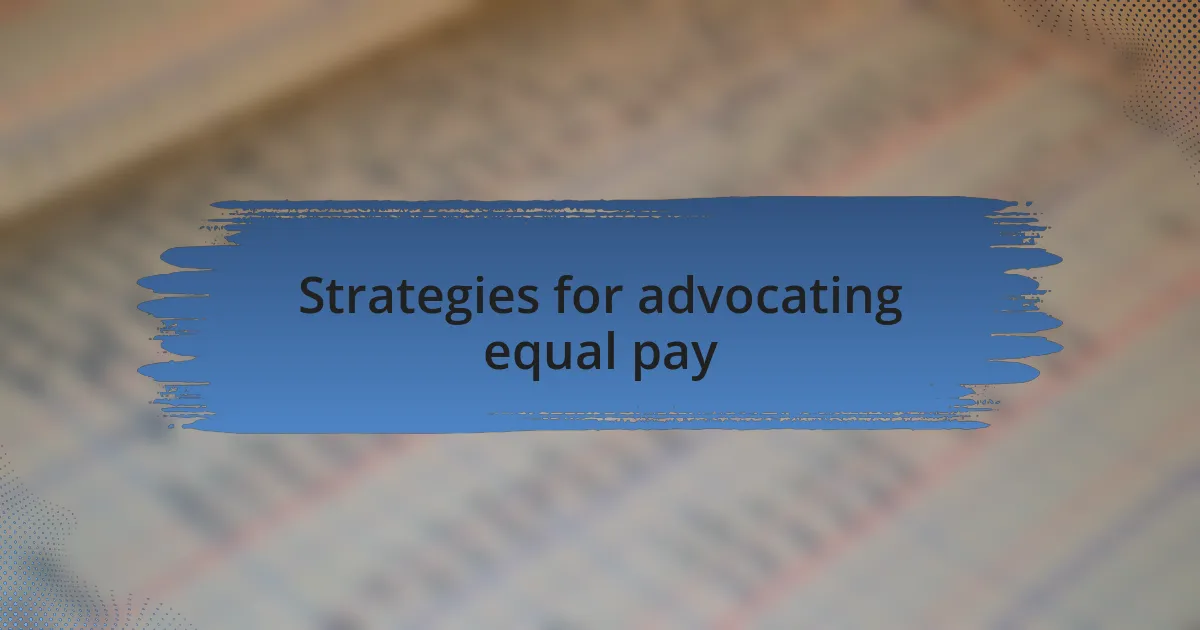
Strategies for advocating equal pay
To advocate for equal pay effectively, one compelling strategy is to encourage transparency within organizations. I remember when my former employer decided to publish its salary ranges; it sparked conversations that led to incredible changes. This openness not only built trust among employees but also motivated action towards correcting wage disparities. Wouldn’t it be remarkable if all companies embraced this level of honesty?
Another vital strategy is to support comprehensive training programs on negotiation skills for women. Early in my career, I attended a workshop that completely transformed how I approached salary discussions. It was eye-opening to realize that many women hold back, fearing backlash or rejection. By equipping women with the tools to negotiate assertively, we foster a culture where equal pay becomes the norm rather than the exception.
Moreover, forming alliances with advocacy groups can amplify our voices in pushing for legislative reforms. I recall collaborating with a local organization that focused on pay equity, and our collective efforts were strong enough to influence policy changes. When we stand united, the impact is profound, demonstrating that advocating for equal pay is not just an individual battle but a shared responsibility that can lead to systemic change.
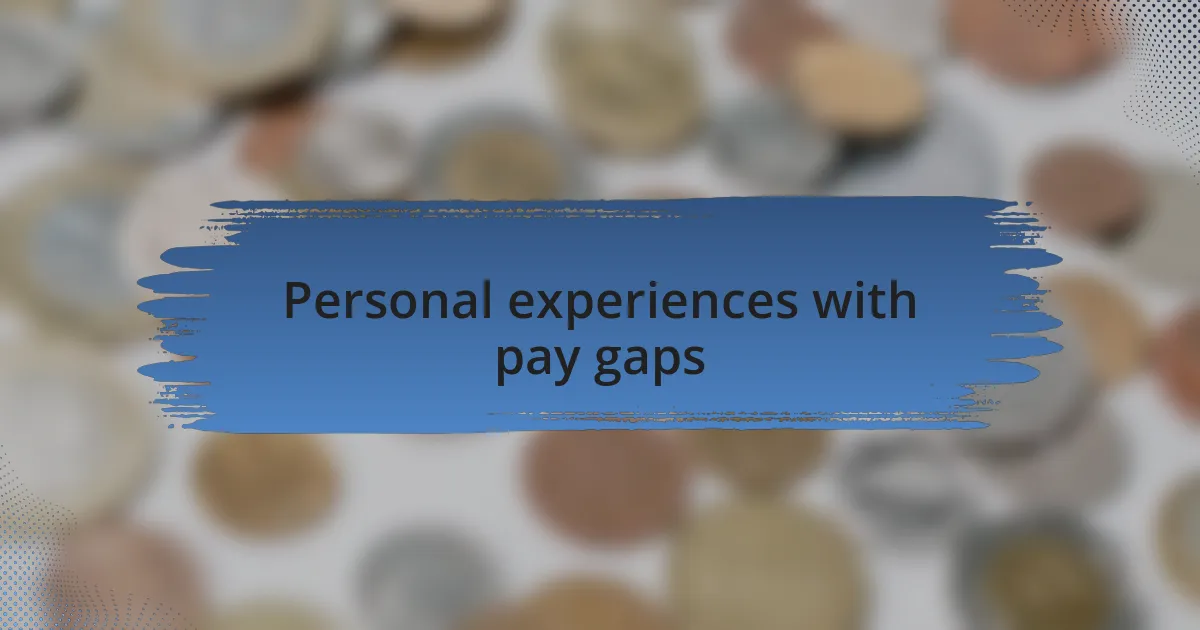
Personal experiences with pay gaps
In my own career, I faced a glaring pay gap when I discovered a male colleague in a similar role earned significantly more. It was disheartening to realize that my years of dedication and experience weren’t valued equally. How often do we find ourselves in situations where our hard work goes unnoticed simply because of gender?
I remember the day I mustered the courage to bring my findings to my manager. I felt a mix of anxiety and hope, fearing repercussions but knowing that silence was no longer an option. That conversation led to a reassessment of salaries across the team, a step towards rectifying the imbalance. Have you ever felt that sense of empowerment when standing up for your worth?
Reflecting on these experiences, I’ve come to understand the emotional toll that pay gaps can take. It’s not just about money; it’s about acknowledgement and respect. Each discussion I had about salary disparity was a reminder that many of us carry similar burdens, silently navigating a system that too often overlooks our contributions. When will we start valuing every individual’s work equally, regardless of gender?
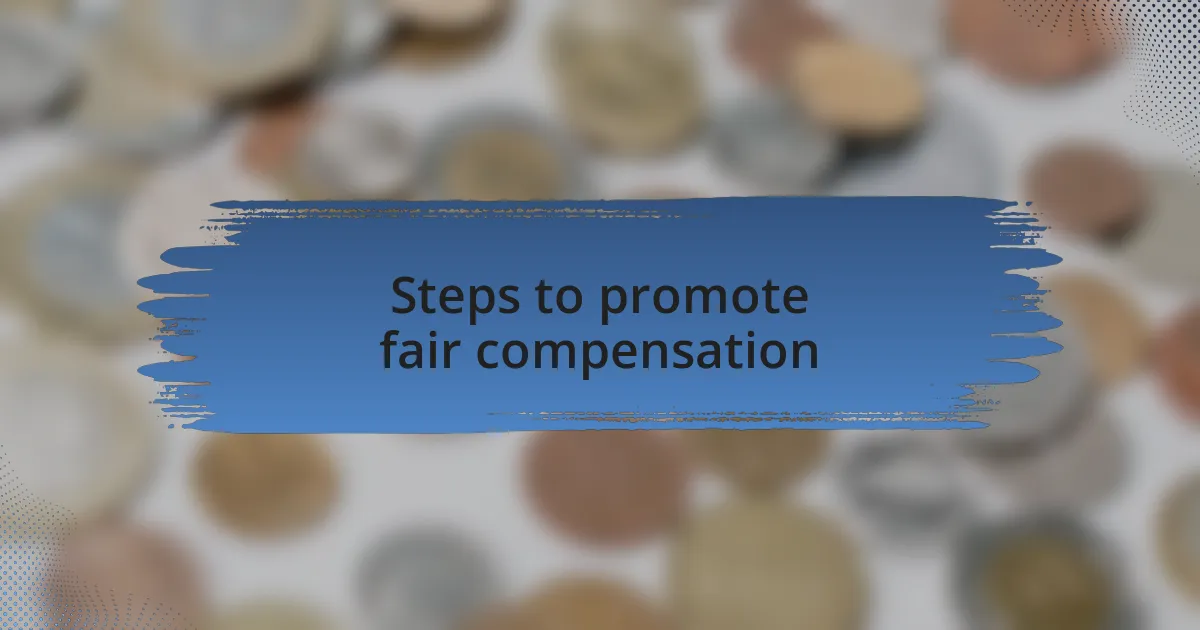
Steps to promote fair compensation
To promote fair compensation, organizations should initiate regular pay audits to assess salary structures objectively. In my experience, transparency in salary ranges can foster an environment of trust, encouraging employees to engage in discussions about their worth. Have you ever wondered how many discrepancies might be hiding in plain sight, waiting to be addressed?
Another effective step is to implement mentorship programs that empower underrepresented groups. I recall how mentorship significantly boosted my confidence and skills, opening doors to new opportunities. Isn’t it time we ensured everyone has access to the guidance necessary to navigate their careers successfully?
Finally, fostering a culture of open dialogue about compensation can lead to lasting change. I learned that vulnerability in sharing my salary concerns helped others feel comfortable doing the same, creating a ripple effect of awareness. How can we expect to rectify pay gaps if we shy away from these critical conversations?